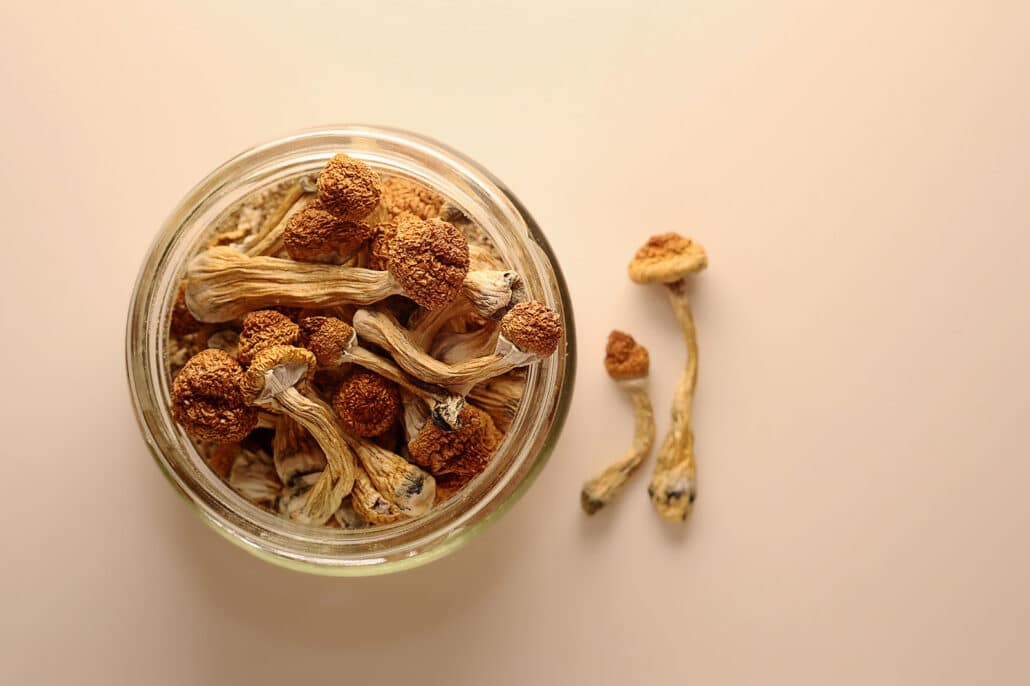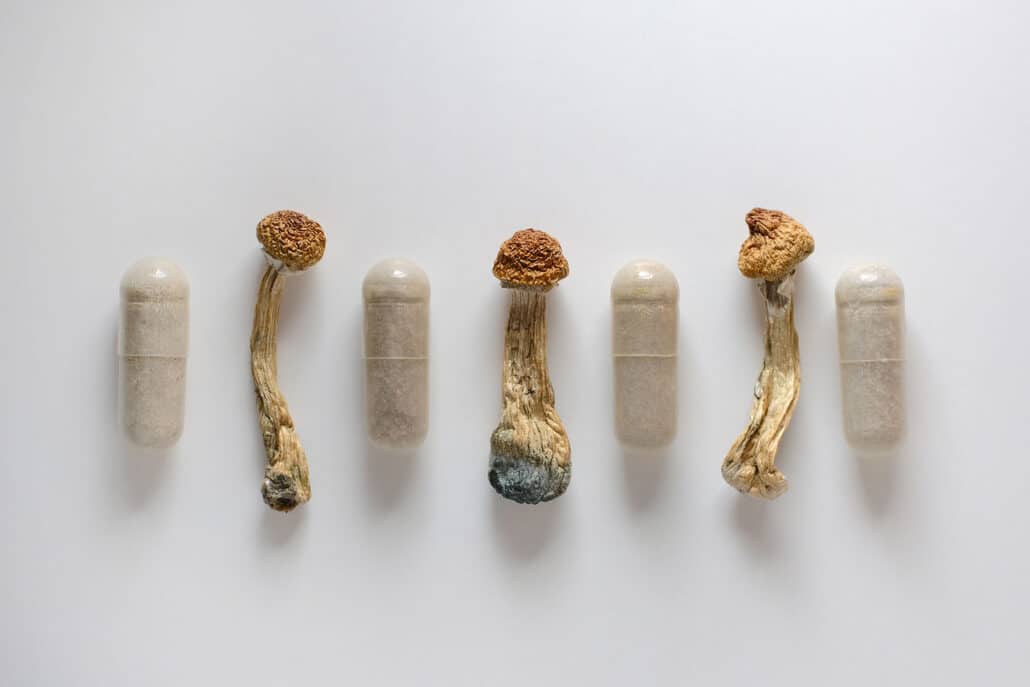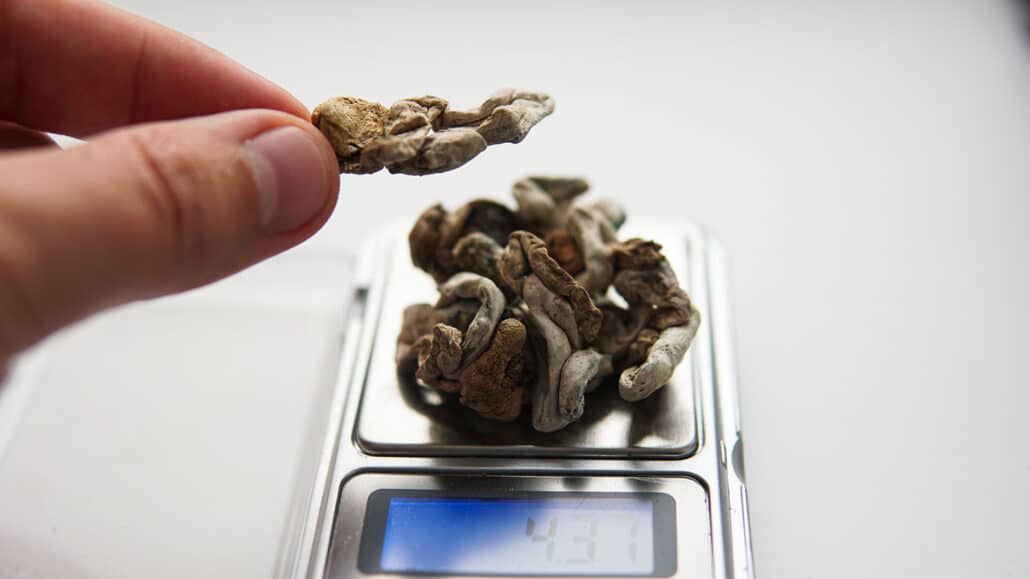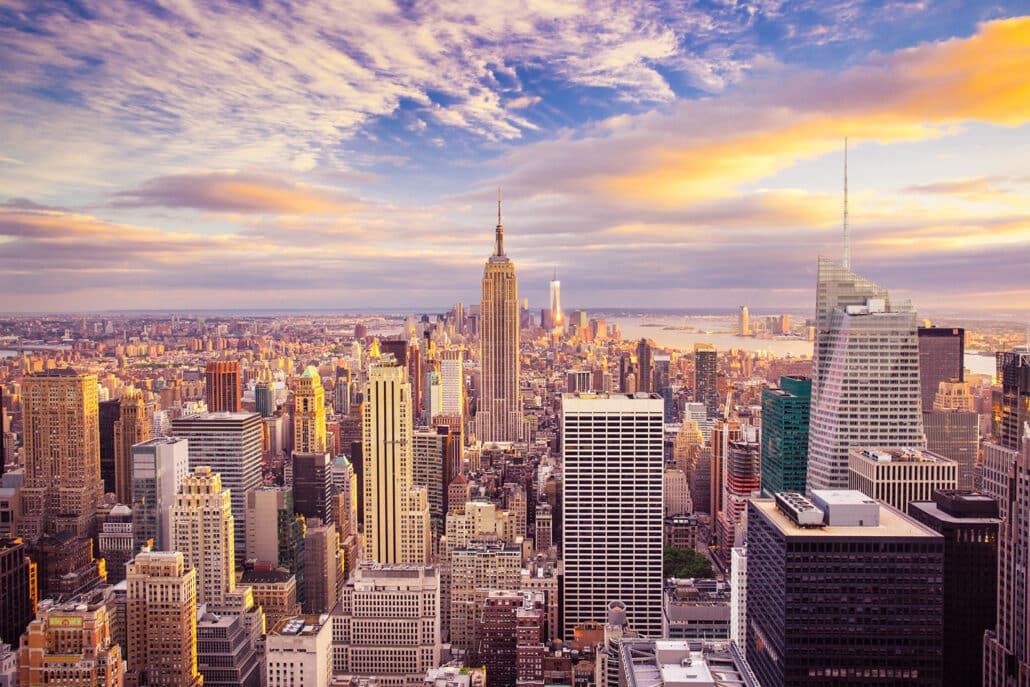A psychedelic revolution seems to be on the rise and not just in New York. It’s a nationwide phenomenon. In just three years, magic mushroom use among young adults nearly doubled, opening the door to bad reactions and harrowing psychological episodes.
How harmful can psychedelic mushrooms be? Is it possible to find psilocybin mushroom addiction treatment in New York?
That’s what we’ll discuss in this post. We’ll also check out psilocybin’s popularity and legality nationwide and in the state.
Table of Contents
- 1 Magic Mushrooms: Addictive or Not?
- 2 Treatment Options for Psilocybin Mushroom Dependance
- 3 Psilocybin as a Medical Treatment for Addiction
- 4 5 Reasons to Stop Illicit Psilocybin Mushroom Use
- 5 Magic Mushroom Use Stats in New York
- 6 Final Thoughts: Seeking Addiction Treatment in New York
- 7 Additional Resources
Magic Mushrooms: Addictive or Not?
While some research suggests that psilocybin mushrooms aren’t typically addictive, it’s possible to develop tolerance and even psychological dependence.

What does that mean, and how does it happen?
Well, magic mushrooms (shrooms) can contain anywhere from 0.2% to 0.4% psilocybin.
Regardless of how you consume these psychedelic mushrooms, your body will break down psilocybin into psilocin. Scientists don’t fully understand how psilocin works. However, they do know that it can easily enter the circulation and target the serotonin 5HT2A receptors.
The result? Altered mood, cognition, and perception, often causing hallucinations. For some people, hallucinations are pleasurable. Others suffer from “bad trips” full of paranoia, anxiety, and confusion.
Bad trips can deter people from using the mushrooms long enough to develop tolerance. However, those who experience pleasurable hallucinations are likely to abuse the substance.
After a while, the person might get used to the emotional and mental aspects of the shroom-using experience—that’s psychological dependence.
Psychological vs. Physical Dependence
Alcohol opiates, benzodiazepines, and barbiturates can all cause strong physical dependence, which means the body can no longer function properly without the substance.
Hallucinogens, however, are known for their psychological dependence. But that’s not to say that this form of dependence isn’t serious.
Psychological dependence can cause cravings and difficulty with quitting.
Diagnosing Psilocybin Use Disorder
The National Institute on Drug Abuse (NIDA) reports that diagnostic guidelines like the DSM-5 don’t recognize psilocybin specifically.
That said, some people pile psilocybin abuse (along with LSD, ecstasy, and ketamine) under the “Other Hallucinogen Use Disorder” label of the DSM-5 guidelines.
We wouldn’t recommend self-diagnosing, though. Diagnosing friends and family members isn’t ideal, either. It’s always better to undergo a professional assessment to understand the case severity and find the best treatment plan possible.

Treatment Options for Psilocybin Mushroom Dependance
Unfortunately, the FDA hasn’t approved any medications as treatments for psilocybin psychological dependence. So, the rehab programs mostly focus on therapy and support groups.
Experts at the American Addiction Center (AAC) believe that the long-term treatment plan for psychological dependence should be more or less like the ones used for traditional physical addictions/dependencies.
This means throughout assessments, follow-ups, adjunctive therapies, and treating co-occurring issues.
There are no hard-and-fast rules for the detox phase, though. Withdrawal syndrome for psychedelic drugs like psilocybin isn’t officially recognized by NIDA. Still, the recovery plan can be adjusted if the patient needs supervised detox or inpatient programs.
Either way, the treatment itself can include:
Cognitive Behavioral Therapy
Cognitive behavioral therapy (CBT) is used to treat a lot of substance use and mental disorders. That’s mainly because it helps individuals identify and change their negative behaviors and thought patterns.
The same principles can help people overcome their psilocybin cravings and develop coping mechanisms.
Social Support Groups
Family groups, social support groups, 12-step meetings, and community mental health care groups can all help create secure spaces for the recovering patient.
Dual Diagnosis Care
In some cases, people self-medicate with psilocybin to relieve symptoms of depression or PTSD. Others might not be aware that they have co-occurring mental health disorders.
That’s why it’s vital to have a holistic treatment plan that simultaneously addresses dependence and other disorders to reduce the risk of relapse.
Keep in mind that magic mushrooms are sometimes sold in combination with other illicit drugs. For instance, “hippie flip” usually contains both shrooms and MDMA (ecstasy).
Plus, abusing magic mushrooms doesn’t only cause tolerance to psilocybin. It can also lead to cross-tolerance to LSD and mescaline. So, the recovering patient might have to deal with more than one substance use disorder as well.

Psilocybin as a Medical Treatment for Addiction
We’ve talked about the therapies that could help someone overcome a dependence on psilocybin. But did you know psilocybin itself can be used as a treatment?
Well, there’s nothing FDA-approved yet, but recent research suggests that controlled doses of the psychedelic drug along with psychotherapy can treat alcohol addiction.
That’s not the only promising area of research, either.
One study shows that psilocybin can relieve the symptoms of major depressive disorder for up to a year. Another explores the use of magic mushrooms in breaking the addictive patterns associated with smoking.
That said, the psilocybin use in studies is always under controlled conditions with adequate supervision and plenty of safeguards. For instance, participants might have to undergo preparatory sessions before they start.
Most of these potential uses need more research to confirm the drug’s safety, too. So, self-medicating with psychedelic mushrooms is definitely not recommended.

5 Reasons to Stop Illicit Psilocybin Mushroom Use
Even though magic mushrooms might not seem as addictive or dangerous as other illicit drugs, they’re not without their risks.
The adverse side effects included synesthesia (mixing up senses), flashbacks, and paranoia. However, the main problems that could drive someone to stop using psilocybin are:
1. Magic Mushrooms Can Cause Psychotic Episodes and Bad Trips
Bad trips from psilocybin aren’t just unpleasant—they can be dangerous.
In a survey of people who had negative experiences with magic mushrooms, 10.7% believed that the trip had put them (or others) in harm’s way. Around 2.6% reported that they acted violently, and about 2.7% had to seek medical help.
The majority of respondents also said the trip was one of the most challenging experiences of their lives. More alarmingly, some of the respondents with pre-existing mental issues said they attempted suicide during the trip.
In addition to the bad trips, a large dose of the mushrooms could cause a psychotic-like episode.
2. Accidents Can Happen With Impaired Judgment
Since psilocybin can impair judgment and coordination, it puts people at risk of accidents, ranging anywhere from minor bumps to major car crashes.
3. There’s a Poisoning Risk
Some people might try to forage wild mushrooms. However, identifying species is tricky, and even experts can struggle.
Picking the wrong mushroom species can lead to fatal poisoning!
4. The Side Effects Aren’t Just Psychological
Shrooms are known for their trips and vivid hallucinations, but their unpleasant effects can be physical as well.
The person could experience numbness, increased heart rate, loss of urinary control, and muscle weakness. The drug could also increase sweating.
5. Psilocybin Is Still an Illicit Drug in New York
Despite all the promising research, psilocybin is still not approved for any medical use. It also has a high abuse potential, which makes it a Schedule I substance in the eyes of the federal government.
A couple of states have started decriminalizing/legalizing magic mushrooms. Oregon was the first, and then Colorado followed suit.
Yet, psilocybin is still illegal in the majority of states, including New York (although there are a couple of decriminalization bills floating around).

Magic Mushroom Use Stats in New York
Psilocybin mushrooms are popular among college students and at night clubs or raves nationwide, and New York is no exception.
A study published in 2019 revealed that more than a fifth of the people going to nightclubs and dance festivals in the city used shrooms. 10.9% reported that the unpleasant side effects got so bad that they were worried about their safety.
In a more recent study, 52.9% of those who experienced adverse effects from psilocybin use in the nightclub scene in New York City had to ask someone for help.
Aside from festivals and clubs, illicit psychedelic mushrooms are getting popular in the city—so much so that, at one point, dealers were openly peddling them in makeshift stalls. Some were more discrete and disguised their illicit products.
However, the brazen deals didn’t last long. An undercover sting operation led to a few arrests later.
Still, it’s hard to gauge how common psilocybin use is in New York and how it compares to the national average.
After all, major entities, like SAMHSA, often bundle hallucinogens (LSD, psilocybin mushrooms, MDMA, peyote, mescaline, etc.) under the general label of “hallucinogens” in their reports.
But for reference, SAMHSA’s 2022 National Survey on Drug Use and Health found that around 8.5 million people use hallucinogens and that these drugs were particularly common with people aged 18–25.

Final Thoughts: Seeking Addiction Treatment in New York
Psilocybin mushrooms may have possible therapeutic benefits. However, that doesn’t change the fact that they’re Schedule I substances with high abuse potential.
If you still have any questions about the available treatments in New York, please contact Long Island Interventions for information about Psilocybin Mushroom Addiction Treatment near you.

